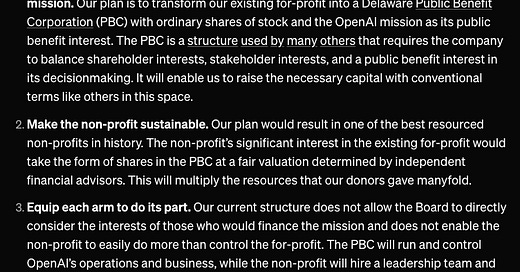The OpenAI corporate revamp seems pretty reasonable
Welcome to Cautious Optimism, a newsletter on tech, business, and power.
📈 Trending Up: Family detention centers … national shame … Russian isolation … sportswashing … AI SDRs? … friendly relations amongst post-Soviet states …
📉 Trending Down: Ola Electric? … Do Kwon … Europe-Qatar ties … Middle East tensions? … single-use plastics in Nigeria … free speech … Chinese industrial profits … interest rates in Turkey (kinda) … tech stocks …
What now?
The fracas between the Tech Trumpers in favor of more high-skill immigration, recruitment, and temporary work permits and the MAGA Right, who favor zeroing out immigration, is now a wide rift in Trumpland.
The situation is humorous in that Tech Team Trump appears slightly gobsmacked that a large chunk of the American right disagrees with its views. Business folks feel that their perspective on the world is the most rational. Therefore, following their conclusions represents the best path forward. And feeling like they just won the election, the Silicon Valley Right wants to open wider doors for talented foreign nationals to come work and live in the United States.
That perspective is running up against the nativists, which you can’t argue with per se, as people in favor of banning anyone new from coming into the country are animated by illogical priors (racism, degrowth, etc).
The jawbone olympics over on Twitter will continue over the weekend and into the New Year, but the present situation highlights an important fact past all the near-term sniping: The modern right has several competing factions inside of it that are often ideologically opposed to one another; once Trump eventually passes the baton and no longer rules the Republican party as his personal fief, the MAGA coalition will fracture into several competing camps:
The Christian nationalists: Skeptical of corporate power, focused on instituting a lukewarm theocracy at minimum
The more Christian you are, the more you have proven yourself to be superior; ergo, we should be led by the uber-Christian.
Example: Senator Josh Hawley
The anti-regulation business folks: Skeptical of government power, focused on instituting a technocracy in which money and power are viewed only as the fruits of meritocratic combat
The richer you are, the more you have proven yourself to be superior; ergo, we should be led by the uber-wealthy.
Example: Elon Musk
The Putin simps, Groypers, neo-Nazis, and other filth that form a plank of Trump support but may struggle to fit into either major right-wing camp
The more batshit crazy you are, the more you have proven yourself to be superior; ergo, we should be led by the most deranged posters.
Example: CO cannot presently afford to get sued.
Good luck sorting that out.
The OpenAI corporate revamp seems pretty reasonable
OpenAI is rebuilding itself because it needs to raise lots more money and make lots more money, and its existing structure no longer fits its needs. That’s the gist that the company gave the public this week by announcing that it is pursuing a new build for its own bones.
Here’s the new plan:
Choosing to convert the “existing for-profit into a Delaware Public Benefit Corporation with ordinary shares of stock and the OpenAI mission as its public benefit interest” makes sense. I am a modest fan of the PBC model, though I have not yet done enough research to have a firmly held view.
That said, what’s good about PBCs is that they have to care about folks other than their owners, as Jens Dammann (UT Austin Law) points out:
A PBC’s charter must name a specific public benefit, such as protecting the environment or reducing poverty. Moreover, when making business decisions, a PBC’s directors must balance the goal of maximizing shareholder wealth with the specified public benefit and the interests of those affected by the PBC’s operations. In other words, the law explicitly dispenses with the principle of shareholder primacy and instead binds the PBC’s directors to a more complex set of goals.
At least in theory, therefore, public benefit corporations have a clear legal commitment to non-shareholder constituencies.
Given that OpenAI says that its mission is “to ensure that artificial general intelligence benefits all of humanity,” the PBC model seems like a good fit. Choosing all of humanity as your ‘non-shareholder constituency’ is bold, but what’s the point of trying to change the world by degrees?
OpenAI is correct that a PBC model will allow it to raise capital like a non-PBC. Allbirds and Warby Parker are both PBCs, as is Veeva. You can read Veeva’s 2024 PBC report here, if you haven’t read one before. Of our three chosen examples featuring a PBC skeleton under their for-profit flesh, two sport multi-billion dollar valuations. Not bad.
The fun bit is the second bullet:
The non-profit’s significant interest in the existing for-profit would take the form of shares in the PBC at a fair valuation determined by independent financial advisors. This will multiply the resources that our donors gave manyfold.
In simpler terms, OpenAI wants to convert its non-profit equity holdings into an equity position in the new PBC. Given that the PBC will be worth a zillion dollars, so too will the non-profit element of OpenAI will own most of a zillion dollars worth of equity.
Observe the following chart from OpenAI, and then reread the above quote:
I volunteer to run the non-profit as I would like to have dozens of billions of dollars to play with. Sam, call me.
OpenAI’s plans could fall apart. The company is being sued by a competitor, which could throw sand into its gears. But as 2024 comes to a close, it’s clear that the AI model giant is getting its house in order to keep pushing in 2025. After shipmas, that brings joy to my little nerd heart.
CO will publish next week in a somewhat abbreviated fashion before returning to regular service shortly thereafter. — Alex




